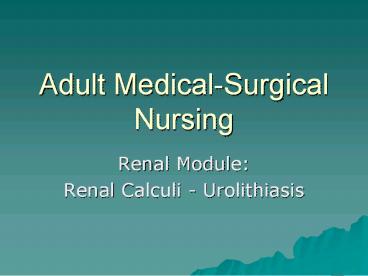Adult Medical-Surgical Nursing - PowerPoint PPT Presentation
1 / 19
Title:
Adult Medical-Surgical Nursing
Description:
Adult Medical-Surgical Nursing Renal Module: Renal Calculi - Urolithiasis Renal Calculi: Description Renal calculi occur from a super-saturation of urine This leads ... – PowerPoint PPT presentation
Number of Views:207
Avg rating:3.0/5.0
Title: Adult Medical-Surgical Nursing
1
Adult Medical-Surgical Nursing
- Renal Module
- Renal Calculi - Urolithiasis
2
Renal Calculi Description
- Renal calculi occur from a super-saturation of
urine - This leads to crystallisation and gravel or stone
formation
3
Renal Calculi Prevalence
- Highest prevalence is in 30-50 year males
- Risk is increased by a lack of substances like
magnesium and citrates in the urine (substances
which prevent crystallisation)
4
Renal Calculi Classification
- Main types of stones are
- Calcium oxalate (major type, independent of urine
pH) 75 - Calcium phosphate (alkaline urine)
- Uric acid (acid urine) (5-10)
- Struvite (related to bacteria and infection
(alkaline urine) (15)
5
Renal Calculi Aetiology
- Family history genetic pre-disposition
- Dehydration hot climates, inadequate fluid
intake, sports activities - Frequent urine infections/ catheter
- Stasis
- Immobility
- Calcium imbalance related to disease
- Diet rich in animal protein (? calcium/ uric acid)
6
Renal Calculi Related Complications
- Obstruction of renal tract. Leads to
- Retention and stasis of urine
- Hydroureter and hydronephrosis
- Destruction of nephrons
- Non-functioning kidney/ renal failure
- Infection
- Direct destruction of nephrons (Staghorn
calculus as a space-occupying lesion)
7
Renal Calculi Clinical Manifestations
- May be symptomless
- If in renal pelvis, deep ache over loin, may
track to suprapubic area or genitalia - Haematuria pyuria
- Acute pain when fragment dislodged (inflammation,
trauma, oedema) - Extreme colic if fragment sticks in ureter
Renal colic
8
Renal Colic
- Severe colicky spasmodic pain over loin,
wave-like reaching genitalia - Nausea and vomiting, sweating
- May have diarrhoea
- Haematuria
- Desire to void but little urine output
- (Prostaglandin E2 release increases contractility
to forward stone,? blood flow and pressure in
ureter pain)
9
Renal Calculi Diagnosis
- Xray KUB (kidneys, ureters, bladder)
- Ultrasound scan
- Intravenous or retrograde pyelogram (not if
acute) - Kidney function tests (KFT) blood urea,
creatinine, calcium, phosphorus, uric acid - Urine culture 24 hour urine calcium, uric acid,
creatinine, sodium, pH
10
Renal Calculi/ Colic Acute Management
- Pain relief
- Narcotic often required
- NSAID (? prostaglandin synthesis)
- Antispasmodic
- Anti-emetic
- Antibiotics
- Intravenous fluid (flushing and dilution effect)
- Removal of calculi (sieve urine)
11
Renal Calculi Methods of Removal
- Lithotripsy with flushing and retrieval
- Via cystoscopy
- Extra-corporeal shock-wave lithotripsy (ESWL)
- Surgery
12
Renal Calculi Methods of Removal
- Via Cystoscopy
- Laser, ultrasound or shock-wave lithotripsy to
fragment the stone - Irrigation and flushing
- Forceps/ basket retrieval of stone or fragments
- Ureteric catheter (stent) left 48 hours to keep
patency until inflammation subsides (and
following all surgical procedures)
13
Renal Calculi Methods of Removal
- ESWL Extra-corporeal Shock-Wave Lithotripsy
- Irrigation and flushing
- Several treatments as an outpatient to fragment
the calculus
14
Renal Calculi Methods of Removal
- Surgery
- Percutaneous Pyelolithotomy (Staghorn) or
Ureterolithotomy and forceps/ basket retrieval - Open surgery Pyelolithotomy or Ureterolithotomy
and irrigation of fragments (less often used now)
15
Renal Calculi Long-term Management
- Diet and fluids
- Lifestyle
- Medications
16
Renal Calculi Long-term Management/ Diet
- Diet (according to type of calculi)
- Reduce animal protein, salt, oxalates
- Increase fluid intake especially before sleeping
at night - Juices as cranberry to acidify alkaline urine
where appropriate - Potassium citrate to alkalise acid urine where
appropriate
17
Renal Calculi Long-term Management/ Lifestyle
- Lifestyle
- Avoid dehydration
- Avoid exposure to hot weather
- Avoid strenuous exercise
- Increase water intake especially at night
- Void regularly to avoid stasis of urine
18
Renal Calculi Long-term Medications
- Calcibind binds dietary calcium in the
intestinal tract - Thiazide diuretic monitors calcium levels
related to increased parathormone - Allopurinol reduces uric acid levels in blood
and urine - Prophylactic antibiotics where chronic infection
19
Renal Calculi Nursing Considerations
- Health education about condition and measures to
control - Awareness of acute management of renal colic
- Preparation for surgical procedures and
post-operative care - Watch for signs of obstruction from fragments.
Sieve all urine

